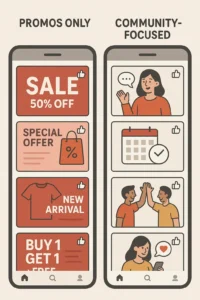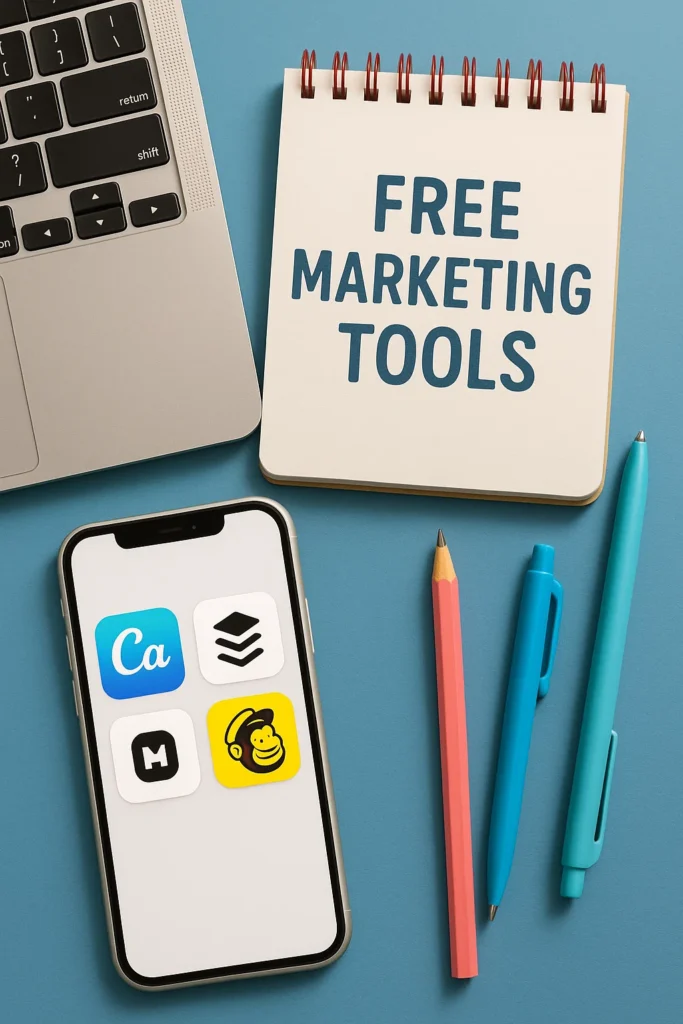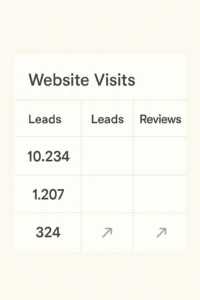Great marketing doesn’t require a big budget—just clarity, consistency, and a little creativity. Focus on low-cost channels like local SEO, referrals, Google Business, and targeted social media. This guide breaks it all down.
Table of Contents
What to Focus On First

You don’t need more—just the right moves
When you’re working with a tight budget, the biggest danger is trying to do everything. Fancy ads, flashy branding, endless social posts—it all sounds great until you’re burned out with nothing to show for it.
The solution? Focus on high-leverage activities that actually move the needle. In other words, start where visibility meets trust.
Pro Tip: You don’t need to go viral—you just need to be visible and reliable to your local audience.
 Three things to prioritize first
Three things to prioritize first
- Be findable: If someone Googles your business or your service in your city, can they find you?
- Be trustworthy: Are there reviews, photos, or a clean website that shows you’re real and reliable?
- Be available: Is it clear how people can contact you, book you, or visit you?
Master those three before you think about advertising, automation tools, or branding tweaks. This guide will show you exactly how.
Build Your Local Digital Foundation

Your website matters—yes, even if you’re a one-person show
You don’t need a fancy website. But you do need a clear one. At minimum, your homepage should tell people:
- What you do
- Where you do it
- How they can reach you
Bonus points if you have reviews, service descriptions, and a form to request a quote or schedule a call. If you’re not sure where to start, check out our guide to building a findable online presence.
 Google Business is your best friend
Google Business is your best friend
If you haven’t claimed your free Google Business Profile, do it now. It’s one of the easiest ways to show up in search results and maps without paying for ads. Fill it out fully, add photos, and keep your hours up to date.
Most importantly: make sure your name, address, and phone number (NAP) match exactly between your website, social media, and Google. This consistency helps Google know you’re legit
Turn Customers Into Your Marketing

Word of mouth is still undefeated
Even in the digital age, referrals are often the highest-converting marketing channel for small businesses. They come with built-in trust. If someone hears about you from a friend, they’re halfway to choosing you already.
The key is to make referrals easier—not just hope they happen. Ask for them. Reward them. Build them into your follow-up process.
Collect reviews like they’re currency (because they are)
Reviews do double duty: they help convince new customers, and they help you rank higher in local search. According to Whitespark’s Local Ranking Factors report, reviews are one of the top signals Google uses to determine which local businesses to show.
Make it easy for happy customers to leave one. Use a direct link, include a thank-you message, and remind them how much it helps.
If you’re not sure what to say or how to ask, we walk through it step-by-step in our post on getting reviews and actually using them.
Reuse your best reviews as trust-building content
Got a glowing testimonial that says you’re “the best contractor in Cobb County”? Don’t just let it sit on Google. Feature it on your homepage, quote it on your service page, share it on social, or use it in a pricing proposal.
Pro Tip: Screenshot your favorite reviews and use them in Instagram Stories, quote graphics, or as section headers on your site.
Get Social (But Only Where It Counts)

Get Social (But Only Where It Counts)
 You don’t need to be everywhere
You don’t need to be everywhere
If your marketing budget is tight, your time probably is too. That’s why spreading yourself across every platform—Facebook, Instagram, TikTok, LinkedIn, Pinterest, X (formerly Twitter)—isn’t just exhausting. It’s inefficient.
Instead, pick 1–2 platforms where your actual customers hang out, and do those well. If you’re a landscaper or contractor, Facebook might make more sense than Instagram. If you’re a creative or visual brand, Instagram or TikTok could be the move.
Focus on local visibility and trust, not just likes
Post content that your community would care about: project photos, behind-the-scenes shots, promotions tied to local events, collaborations with other businesses. Tag your town, use local hashtags, and show up in your digital neighborhood the way you would in person.
Remember: You’re not trying to go viral. You’re trying to stay visible and relevant in your space.
Engage like a neighbor, not an ad
Comment on other local posts, shout out your favorite businesses, and respond to your followers like a human being—not a brand bot. Small businesses win on social when they feel like a trusted neighbor, not a walking coupon.
Pro Tip: Look at your last 10 social posts. If 80% are just promos, it’s time to rebalance. Aim for value, story, or connection in most of what you post.
Free and Low-Cost Tools to Try

Don’t waste money when you don’t have to
There are amazing tools out there that help small businesses manage marketing—many of them free or budget-friendly. Don’t assume you need an enterprise-level CRM or ad manager on Day 1.
Starter tools we recommend
- Buffer – Schedule posts for Facebook, Instagram, and X. Free for up to 3 channels.
- Mailchimp – Build your email list and send simple campaigns. Great for newsletters, promos, and follow-ups.
- Canva – Create beautiful graphics for social posts, flyers, or website visuals without needing design skills.
- Google Business Profile – Not a tool, but a must-have free listing. Shows up on search and maps.
- Google Search Console – Tracks how your website appears in Google search results.
- Google Analytics – See who visits your site, where they came from, and what they did.
 Start with just one or two
Start with just one or two
These tools are all great, but you don’t need to use them all at once. Pick the ones that solve your most immediate need—whether that’s posting consistently, getting email subscribers, or improving your visibility online.
Pro Tip: Choose tools that you’ll actually use. A free tool collecting dust is still costing you time.
Know What’s Working (and What’s Wasting Time)

Time is your most expensive marketing resource
If you’re doing your own marketing (and most small business owners are), your time is more valuable than your budget. Don’t waste hours on things that don’t work just because they’re “free.”
Instead, keep an eye on a few key indicators to guide what you keep doing—and what you kill.
Metrics that actually matter for small businesses
- Website traffic: Are people visiting your site from search, social, or direct?
- Calls, form submissions, or quote requests: Are visitors taking action?
- Search visibility: Are you showing up for “near me” or local searches?
- Engagement on social: Are you getting real interaction from your local audience?
- Review count and rating: Is your reputation improving over time?
You don’t need to track everything. Just track what connects to your goals. If you’re not sure where to look, our guide to measuring marketing success breaks it down by tool and goal.
 Check in monthly and adjust
Check in monthly and adjust
Once a month, block 30 minutes and look at the basics. What went up? What stayed flat? What took time and gave you nothing back?
You’re not guessing anymore—you’re learning and adapting. That’s how small businesses build momentum.
Pro Tip: Keep a simple Google Sheet or notebook with 3–5 monthly KPIs. Consistency makes patterns (and wins) easier to spot.
Next Steps

Start small. Stay focused. Build momentum.
Low-budget marketing isn’t about doing less—it’s about doing smarter. Start with the 2–3 tactics that make the most sense for your business right now. Maybe that’s fixing your Google Business Profile, asking for reviews, or finally publishing that homepage you’ve been tinkering with. The important thing is to start. Consistency will do more for your brand than any overnight gimmick ever could.Where to go from here
- Need a starting point? Our post on how to market a small local business goes deeper into building your foundation.
- Want help? Book a free consultation and we’ll map it out together—no hard sells, just honest strategy.
- Prefer DIY? Check out our upcoming toolkit of free templates and step-by-step checklists for small business marketing (coming soon).
Pro Tip: You don’t need more motivation—you need a next step. Pick one. Start today.

